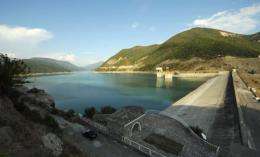Georgia looks to tap hydropower potential

Georgia is hoping to tap into its abundance of high mountains and fast-flowing rivers to transform a country that once suffered from repeated blackouts into a regional hydro-electric superpower.
The ex-Soviet republic's government believes the country's untapped hydropower potential is so vast that it can become a key regional electricity provider, doubling its gross domestic product in a decade and creating 10,000 new jobs.
But sceptics are raising doubts about the government's ambitious plans, warning that attracting the six billion dollars (4.4 billion euros) in needed investment will be difficult for a country that last year saw foreign direct investments drop by 51 percent.
"Georgia has already had a great success in overcoming an energy crisis and becoming a net energy exporter," the country's deputy energy minister, Mariam Valishvili, told AFP in an interview.
"In 10 years Georgia will be a regional leader in hydro energy export," she said.
Wracked by economic chaos after gaining its independence with the 1991 collapse of the Soviet Union, Georgia suffered from severe energy shortages in the 1990s and early 2000s.
After coming to power in the 2003 pro-Western Rose Revolution, President Mikheil Saakashvili made energy sector reform a key domestic policy and in recent years the country has enjoyed stable supplies and even begun to export about one billion kilowatt-hours per year.
Valishvili said Georgia is now hoping to build up the capacity to export 10 to 15 times that much electricity, mainly to neighbouring Turkey.
A few key steps have already been taken, in particular the launch last year of construction of a new high-voltage transmission line that will allow Georgia to export 10 times more power to Turkey. The 380-million-dollar (277-million-euro) project is being financed by foreign investment banks and the transmission line is expected to come online in 2012.
Once linked to the Turkish power grid, Georgia will be able to export electricity not only to Turkey, but also to markets in eastern Europe, Syria and Iraq.
The government last year also signed a one-billion-dollar (730-million-euro) deal with a South Korean-Turkish consortium to build three enormous hydropower plants on the Rioni river at Namakhvani in the western Imereti region. Construction is due to begin in 2011 and take six years to complete.
In total, five hydropower plants are already under construction and contracts have been signed to build 16 other plants.
The European Bank for Reconstruction and Development (EBRD), which is helping to finance the new transmission line, said the country's electricity export plans are realistic.
"Georgia has the potential to be a regional champion for hydro energy production," the EBRD's senior banker for power and energy, Laurent Chabrier, told AFP in a statement.
Georgia's "location at the crossroads between Turkey and the Caucasus positions it very well for selling this energy to rapidly expanding markets," he said.
Valishvili said low production costs will be Georgia's main competitive advantage. Generating a kilowatt-hour of electricity in Georgia costs only five to six US cents (three to four euro cents) and the power can be sold to Turkey for 10 US cents (seven euros cents), she said.
Still, analysts said Georgia will need to overcome the scepticism of foreign investors if it hopes for the plan to succeed. Once booming with foreign investment, Georgia saw investors flee the country after its disastrous 2008 war with Russia and amid the global economic downturn.
Many investors remain concerned that Georgia is not a secure place to do business, said Giorgi Gaganidze, an economics professor at Tbilisi State University.
"The main challenge is to convince foreign businessmen that it's safe to invest money in Georgia," he said.
"Investors who are expected to bring in huge sums of money with no prospects of immediate gains need rock-solid security guarantees."
(c) 2010 AFP


















